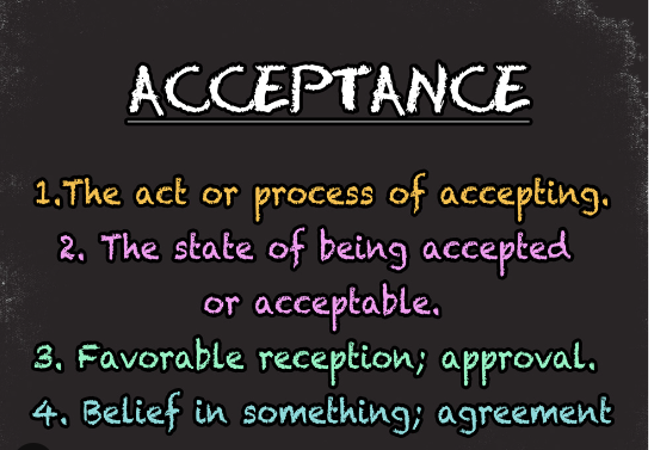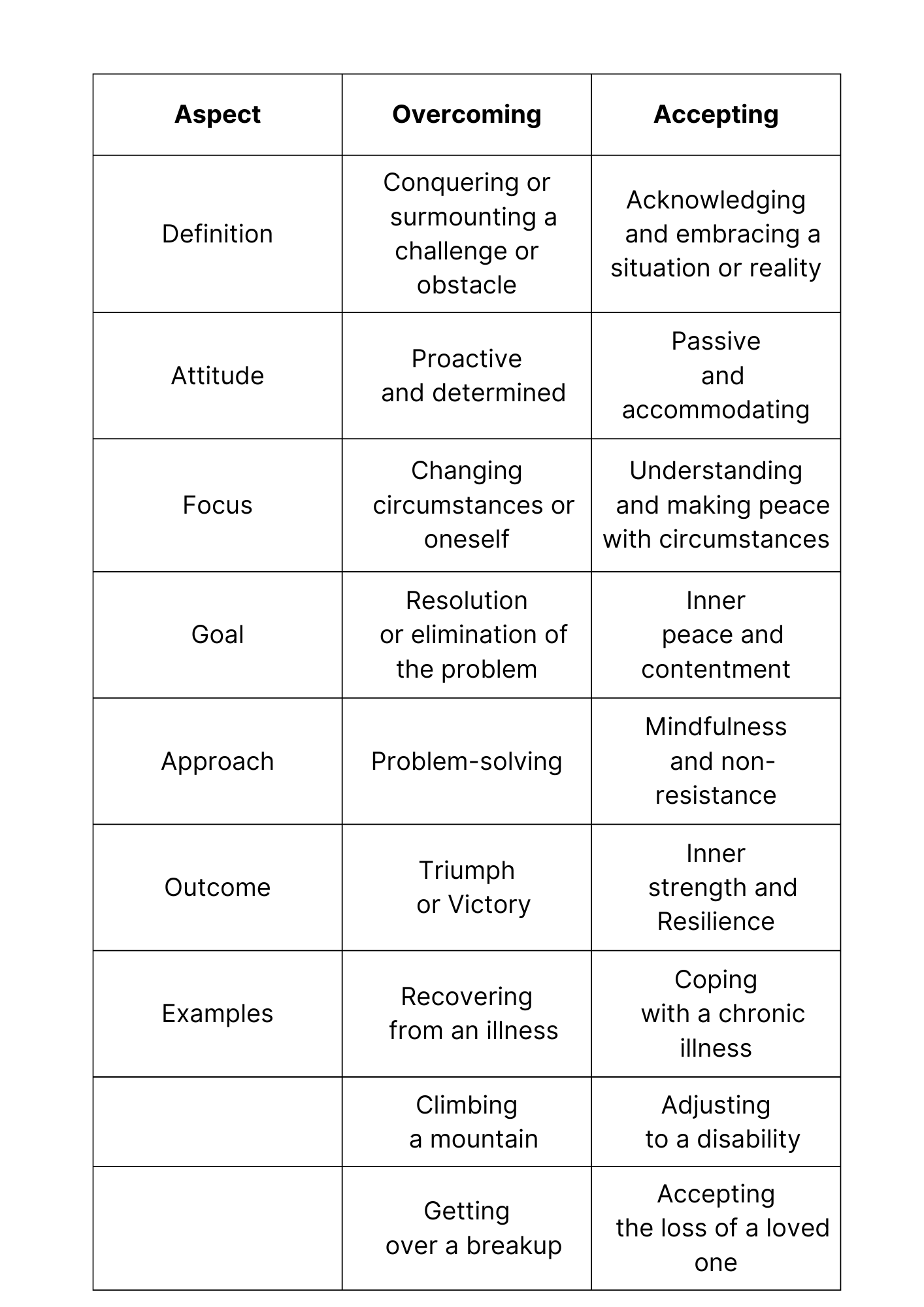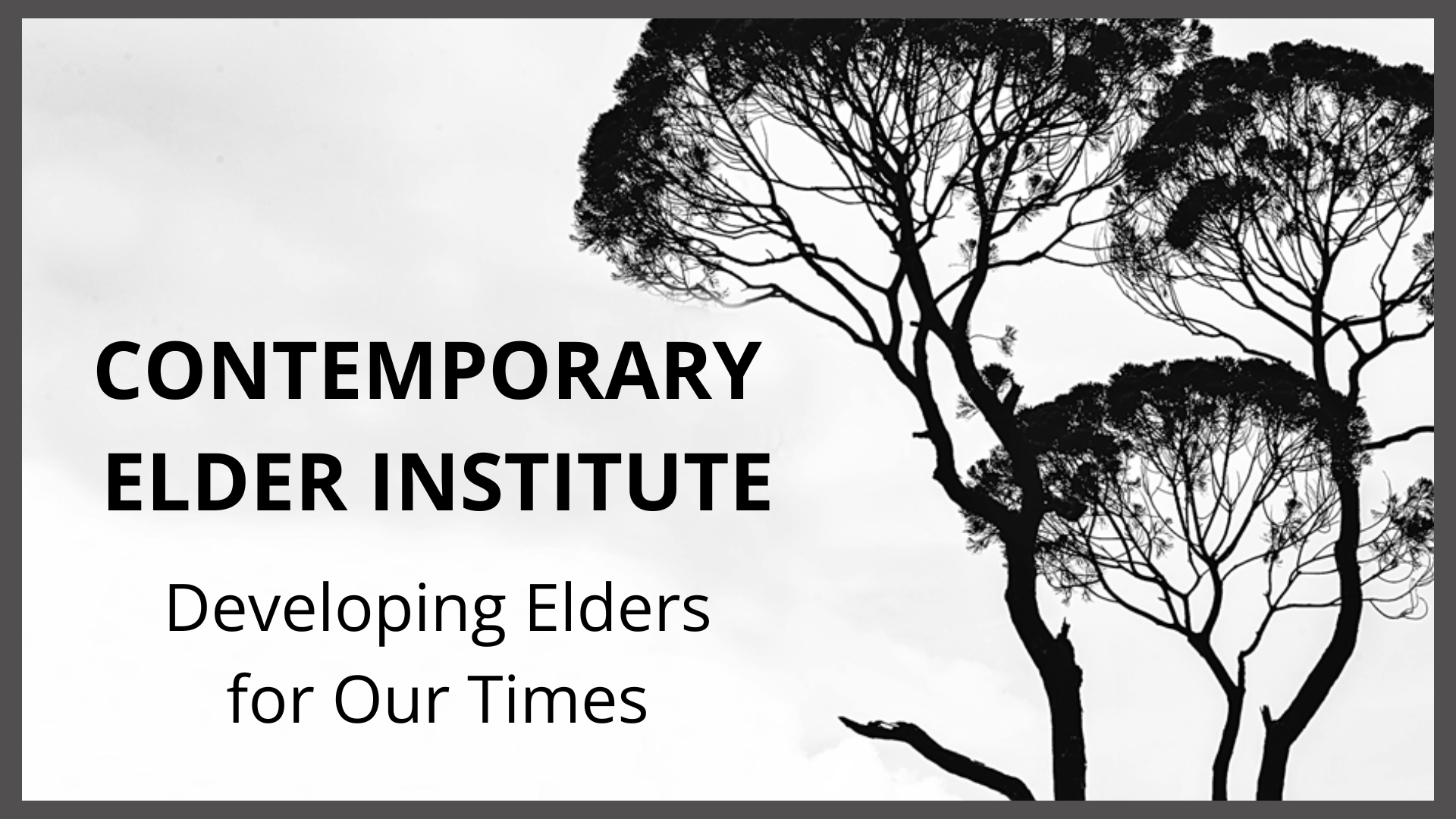WHO ARE YOU? OVERCOMING or ACCEPTING
WHO ARE YOU? OVERCOMING or ACCEPTING

Overcoming and accepting are two distinct approaches to obstacles, difficulties, and problems. I’ve been thoroughly indoctrinated and have actively practiced overcoming for many years. I’m a blackbelt in overcoming.
Accepting has not been easy for me, given my Western cultural programming, professional career path training and development, and my family history. Overcoming was my only mantra.
Overcome means “succeed in dealing with a problem or difficulty; prevail; overpower.” Synonyms for overcome: “control, tame, master, conquer, defeat, vanquish, beat, best, subdue, triumph.” Seems overcoming produces a context of combat, which makes me a combatant, someone engaged in a war.
Furthermore, I grew up in the post-World War II American culture steeped in individualistic ideologies, emphasizing personal agency and autonomy, pursuing financial success, and becoming noticeably recognized. High test fuel to operate in overcoming.
The cultural narratives, movies, books, podcasts, and social media all loudly celebrate overcoming adversity. We praise perseverance and admire the ability to overcome hurdles. We applaud characters that have faced their hardships, ultimately conquering them.
I grew up on the Lone Ranger, Green Hornet, the Shadow, and Superman on my GE radio, sitting on my bedroom nightstand. Overcoming was media indoctrination from the very beginning. Heros always overcome.
Then, there was the overlying family history. Father, a first-generation Jew, left in the middle of the night at age 11 as the only male in the family with his mother, Sarah, and his older sister, Florence. Escaping a Russian-occupied village near Odessa, a village that had just suffered a pogrom where half the village had been massacred.
Across a frozen river, ultimately through Austria, France, and England for his journey to America. Relegated to Steerage with hundreds of other immigrant families on a boat for days. Finally, Ellis Island only to have his ancestral family name Americanized before entrée.
That was my father’s experience in 1921. That was my heritage. Sidney Cooper fought hard to become an upwardly mobile middle-class individual, and he did it as a Jew. He had much to overcome. Overcoming was in my blood and reinforced by everything and everyone around me.
Overcoming obstacles fits the belief that we can aggressively take charge of our destiny, set goals, and diligently achieve them. The center of the American Dream, which claims to be achievable by any American through diligence and hard work. The American Dream emphasizes overcoming as one of its core operating principles.
Overcoming calls for strong and focused, strident effort against something or someone. But what is baked into the overcoming formula is “something is wrong here; something is wrong with “them, it, or me.” Usually, them, but if you’re Jewish, me.
Something is not right. Something must be changed. So, inherent in overcoming is it “shouldn’t be this way” or “I shouldn’t be this way.” Whichever or whatever needs to overcome “shouldn’t be.”
But when carefully and consciously examined, under the hood of overcoming, and all the “shoulds and shouldn’t be’s” is the ego. The ego is who you think you are. Your identity, beliefs, desires, and perceptions. The ego is hugely insecure and requires validation and adoration. When you overcome, the ego gets its dopamine fix.
But the fix doesn’t last. You come down. So, you must do it again – and again and again and again.
Overcoming shaped my life, personality, career, and who I was. But then, as I aged, I started to look at the balance sheet more carefully. The costs were getting bigger, and the benefits were shrinking.
MY COSTS, AND MAYBE YOURS, OF OVERCOMING
My experiences of overcoming created an unrecognized yet insistent self-induced pressure to achieve. This pressure led to veiled stress with occasional light touches of anxiety. The spring in this clock always had to be wound. The pressure from overcoming kept the spring tense and preloaded.
The knob to wind the clock was my inner critic, with its “flaw-identifier,” the ego’s deadliest weapon, kept me in tow.
What went missing for me when I was in the throes of overcoming was “possibility.” When you’re overcoming, the future gets very narrow. Only one destination. There is no time to look up and see the trees, streams, or sky walking the rocky overcome trail. You’re afraid you might fail or falter. Head down. Trudge onward, overcoming the narrows life.
While overcoming, I noticed my resistance to acknowledging and expressing emotions. In overcoming, I needed to suppress complicated feelings rather than be with them as part of my human experience. Close-down feelings allowed me to plow ahead.
As I began to look for greater contentment and freedom, overcoming was certainly losing its appeal.
Fortunately, I eventually encountered my mystical and spiritual teachers. What I noticed was that they weren’t overcoming anything. Life seemed effortless. They could go with the flow and make it happen somehow using the flow. There was no suffering, struggle, or drama.
How did they do that?
Unlike our Western culture, these mystical and spiritual teachers did not hold acceptance as a passive act. Acceptance required a higher consciousness, a wiser awareness, and a sense of the divine.
They held acceptance as a strength, not a weakness. They saw acceptance as empowering rather than succumbing, capitulating, or conceding.
These mystics and teachers knew that acceptance occurs in a different temporality. Overcoming has urgency with short-term aims. It became evident that overcoming didn’t make me happier, more content, expand my sense of peace, or allow greater unrestricted freedom and self-expression.
What became evident was that acceptance was far more unhurried. Since everything changes, acceptance could wait for the right time to make the best moves to alter the future. Or take no action because it would go away on its own. Didn’t need any intervention.
Acceptance had no strain.
When practiced, acceptance puts me in the right place, at the right time, with the right people, and the actions are effortless because they are the right actions. Acceptance requires wisdom, and wisdom always knows “when.” When practice acceptance, my higher wisdom emerges. For me, that’s the most significant benefit.
LET AI LAY IT OUT FOR YOU (OpenAI)

ACCEPTANCE IS A PRACTICE
Acceptance enables me to let things be, let people be, and let myself be. Acceptance sweeps away judgment, assessment, and issuing a verdict.
What I have discovered about acceptance is that I no longer feel resistance; instead, I feel resilience. I don’t get stuck in a cycle of frustration or despair over things I can’t amend.
Acceptance trains me in patience, yielding more surface area for insight and self-understanding. I am much easier to get along with because I have come to accept myself, my whole self, benevolently. I can accept reality as it is, allowing me to accept others more readily and graciously.
But for me, the most significant benefit of acceptance is on the metaphysical side. When I can fully accept who I am and how the world is, I begin to see more with Divinity's eyes.
Acceptance
God in His infinite wisdom
Did not make me very wise -
So when my actions are stupid
They hardly take God by surprise.
by
Langston Hughes
NOTICES
Add the Sangha calls to your week - so you remember.
Try just one of these conscious-raising encounters and notice its impact. See what happens when you listen to one of these. It might be just what you need.
Poems by Ed
Meditations by Judy
Benedictions by Derrill
Or add The Contemporary Elder playlist to your Spotify channel. And then listen to the lyrics.
Any of these will help you remember who you are beyond your daily life.
I also invite you to join one of our open Sangha calls.
One more space is open for the retreat if you want to jump in.
